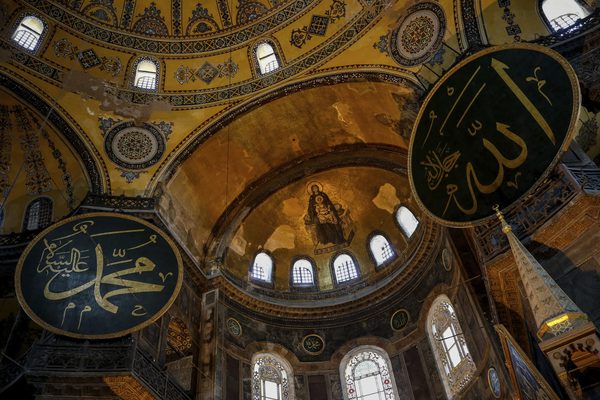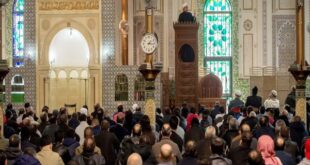
Inter-faith dialogue has become an urgent necessity today. In this regard, what role can or should madrasas play? Can they indeed play any role at all in this? Before discussing this issue, it is important to understand why inter-faith dialogue has become so necessary today.
Undoubtedly, in today’s world inter-community harmony is a major need, and the lack of it has emerged as a major challenge. Inter-faith and inter-community harmony must be built on the foundations and concerns that different faith communities share in common. It must also seek to build bridges of understanding between these communities, and to remove mutual misunderstandings that are a major source of inter-community conflict.
In the aftermath of the attacks of 9/11, Muslim religious groups in the West, for instance, have increasingly realised the pressing need for inter-faith dialogue. They have invited people of other faiths to visit mosques and the offices of Muslim organisations so that they can observe what happens therein and can have their questions and concerns about Islam and Muslims answered. This has had a positive fall-out in terms of improving inter-community relations, which is itself something that Muslims themselves require.
Several Muslim countries are also developing plans for promoting inter-faith dialogue. In June 2008 the Rabita al-Alami al-Islami (‘World Muslim Council’) organised an international conference on inter-faith dialogue. This was a very major initiative. At the conference it was decided that an international institution would be established to further promote this sort of dialogue. It was also decided to institute an award for inter-faith dialogue work. Through these and similar initiatives, one hopes that Muslims will now play a major role in promoting inter-faith understanding and peaceful dialogue.
Muslims, madrasas and inter-faith dialogue in India
The biggest challenge facing Muslims throughout the world today are the negative and distorted images of Islam. I do not wish to go into the reasons for this. This is a fact and we have to acknowledge it. Even if one claims that this is a result of the machinations of anti-Islamic forces, it does not diminish the danger of this challenge. This is why, as followers of a religion that addresses itself to all of humankind, Muslims must themselves make efforts to change the situation and seriously address this issue.
In a country like India where, for a long time now, religion has been cynically used as a tool for politics, the urgent need for inter-religious dialogue is obvious. At the practical level, however, this sort of work has not even begun. Given the respect and confidence that madrasas enjoy among the public and the fact that they are spread out throughout the country, if inter-faith dialogue work were to be taken up through the madrasas it would enjoy greater public credibility and its impact would be wider and deeper. Ulema with a deep knowledge of religion would be best suited for this task.
In addition, dialogue is also the best and most effective method to seek to counter the mounting propaganda against madrasas. Certain extremist religious forces are leading this anti-madrasa propaganda assault. Hence, it is best that the ulema of the madrasas, as well as other Islamic religious leaders, seek to counter this campaign, using dialogue as a means to reach out to others.
In March 2003, the Vishwa Hindu Parishad organised a massive rally in Delhi. During the rally, copies of the Quran were distributed to those present. The VHP claimed that the Quran preaches hatred and even the indiscriminate killing of non-Muslims. This was a very opportune moment for the ulema and those related to the madrasas, which they should have used to initiate a dialogue on the actual meaning of the Quranic verses on jihad which the VHP claimed preached such things.
Unfortunately, even today the madrasas are not engaged in any serious or meaningful inter-faith dialogue work. Instead, they continue to follow the tradition of polemics which emerged in the medieval period. Polemics are still taught as a separate discipline in many madrasas. Much polemical literature has been produced over the years by the madrasas, but they are today of little practical use.
The polemical approach is now almost wholly useless. It centres on verbal duels, and aims simply at defeating one’s opponent and seeking to claim victory for oneself. It does not lead to one’s opponent being inspired to introspect and review his or her stance. It also results in further widening the distance between the contending parties and building up high walls of hatred and prejudice.
In contrast to polemics, dialogue is a serious and, indeed, natural method of relating to people of other faiths. Through dialogue, each partner is able to present his or her own views without obstacle. This enables both parties to understand each other dispassionately. It can thus help dissolve misunderstandings and prejudices that give rise to hatred and conflict. Muslims believe in the universal truth of their faith, and so it is their responsibility to seek to identify, analyse and then do away with the roots of inter-communal hatred. If these roots are allowed to grow unchecked, it will obviously have a seriously negative impact on Islamic mission.
Madrasas are the bastions of faith. But they should not fortify themselves in their own world, cut off from the world around them. In order to carry out the work of inter-faith dialogue, it is imperative for the students, graduates, teachers and managers of madrasas to actively engage and interact with others, including students of ‘modern’ schools and colleges.
One way to do this is to encourage mixed activities, such as sports competitions, essay writing competitions, quizzes etc, in which students from both madrasas and ‘modern’ educational institutions can jointly participate. Madrasas can also invite the staff of ‘modern’ educational institutions to visit their campuses and dialogue with their students and ulema. This can go a long way in helping to combat the many misunderstandings that they might have about madrasas.
To equip madrasa students, as would-be ulema, with the appropriate skills and knowledge needed to effectively engage in inter-faith dialogue, madrasas must incorporate the teaching of social sciences in their curriculum. The present insularity of the madrasas and the fact that madrasa students are kept unaware of many important aspects of the wider world have led to a crippling sort of self-imposed immaturity. This can be addressed, at least in part, by providing madrasa students with sufficient awareness and understanding of the world around them.
For this purpose, too, madrasas must introduce the teaching of comparative religions. Several books have been written on the subject by Islamic scholars, but most of them are centuries old, as for instance the writings on other religions by scholars like Ibn Hazm, Abdul karim Sharastani, Ibn Taimiya, Ibn Qayyim Jauziyya etc. I do not deny the importance of these books but one has to keep in mind the fact that the world has undergone revolutionary social, political and intellectual changes in the last two hundred years.
In the West, modern ideologies such as Communism, Capitalism, Secularism, Liberalism, Modernism, Post-Modernism and so on have assumed the form of virtual religions. For inter-faith dialogue initiatives to be more effective, these ideologies also need to be carefully studied. In India , too, some influential ‘ultra-secularists’ have adopted these ideologies virtually as their religion. At the same time, the majority of Indians, including a large section of ‘modern’ educated people, still adhere to religion or at least claim to do so. Hence, dialogue work needs to be engaged in at both levels, and for this our ulema need to have a deep understanding of other faiths as well as of the new Western ideologies that have also come to function as religions.
In conclusion, I wish to reiterate that madrasas must indeed take an active interest and role in inter-faith dialogue work. It will help them undermine the hostility that they presently face from some quarters. The ulema of the madrasas should take the initiative themselves, without expecting others to do so first. As the popular saying goes, ‘My message is love. Let it go wherever it can’.
Dialogue is the best practical expression of this message. To combat communal hatred and promote inter-community harmony, people of different faiths, including Muslims, and particularly the ulema, must strive to promote a culture of dialogue. And in this madrasas must play an important part.
 IRST Institute of Religious & Social Thoughts
IRST Institute of Religious & Social Thoughts
